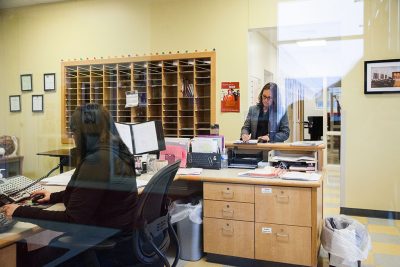
Editor’s Note: The following story originally appeared on UConn Today, the University of Connecticut’s news website.
The field of education has been going through constant evaluation and evolution since 1983, when “A Nation At Risk” was published.
“That report sounded the alarm that the United States was not at the top of the food chain anymore when it comes to education,” says Richard Gonzales, director of UConn’s Neag School of Education leadership preparation program.
Since then, responses to the report have encompassed curriculum changes and standards, teacher preparation, and in the early 2000s, a growing emphasis on leadership – in particular the role and training of school principals.
UConn is now one of seven universities that are part of The Wallace Foundation’s University Principal Preparation Initiative, a four-year, $48.5-million program aimed at improving training for aspiring administrators. The Foundation encourages administrator training that emphasizes the practical aspects of the job and includes instructors who have been school leaders themselves.
Overall, the universities in the initiative have developed stronger partnerships with districts where their graduates will lead schools. Some have made headway in curriculum design, a key component of the initiative. All have measured their programs against state and national leadership standards to identify areas to work on, according to Education Week.
“We are doing things today that will become the norm for the next 10 to 20 years – and that is huge,” says Gonzales, who oversees the UConn Administrator Preparation Program (UCAPP).
UCAPP has redesigned its program, introducing changes that will go into effect this July. Among those, UCAPP students will now have leadership coaches, who will guide them in planning and strategizing. The coaches, like the program’s mentors of the past, will continue to be selected from among current and retired principals and administrators.
“We are shifting from supervision to coaching in terms of how our UCAPP students are taught, and the coaching is going to be around authentic tasks,” says Gonzales. “We are taking the current administrator evaluations, and redesigning our coursework to align with that.”
The curriculum redesign factors in data about instructional leadership, talent management, and organizational leadership – the domains that have been prioritized by the State of Connecticut, says Gonzales.
“The school systems in Hartford, Meriden, and New Haven helped us redesign our curriculum so students know what it takes to be a principal in a city like that,” says Gonzales. “Our program became much more contextually based. Instead of teaching evaluation and supervision, we used the actual instruments and resources that principals use.”
UCAPP enrolls current teachers who have an average of eight to 12 years in the classroom and have shown evidence of leadership work. Cohorts of students in six different Connecticut towns – Hartford, New Haven, Stamford, Guilford, East Hartford, and West Hartford – take two years of classwork, and do a 12-credit internship to complete the program.
“First and foremost, a good principal understands the social aspect of the work, and they are grounded in the communities in which they work and serve,” says Gonzales. “We emphasize early on that the communities in which you serve are your constituencies. You serve that area, the people – all of them.”
Gonzales notes that UConn’s principal preparation program prioritizes leadership coaching from the beginning.
“The coaching provides us with a day-to-day look at what goes on at a school,” says Kathryn Lenehan ’10 (ED), ’11 MA, a second-grade teacher at Lake Garda School in Burlington, whose coach is Kelly Sanders ’12, a principal of the West District School in Farmington, and a UCAPP graduate.
“It’s nice to work with someone who has been trained,” says Lenehan. “We have conversations like ‘why did you do this?’ or ‘is this the first time it happened?’ – information you can use when you are principal of a school someday.”
“It’s an exciting, challenging time in education and to be a principal,” adds Megan Baker ’12, principal of Tourtellotte Memorial High School in Thompson, “and having ‘courageous conversations’ with teachers is a big part of it.”
Gonzales says one of the best compliments he receives about UCAPP is about the way it values teachers. “UCAPP understands that a principal’s role is about supporting the teacher, the student, and the curriculum,” he says. “Principals are there to create the conditions for everything to work.”
 Facebook
Facebook
 Twitter
Twitter
 LinkedIn
LinkedIn
